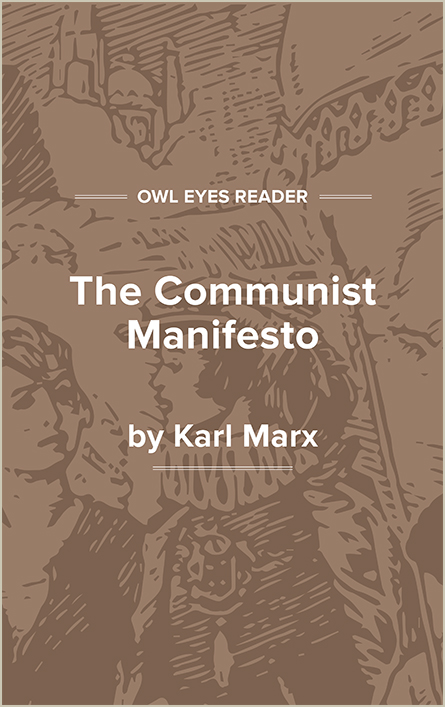Study Guide
Summary
The Work
Written by Karl Marx and Friedrich Engels for the Communist League, The Communist Manifesto has become a classic formulation of socialist political ethics. The authors base their work on the ethical belief that all people should live in a condition of equality and democracy. They contend that all previous societies have been marked by class struggle. This conflict between different social classes is rooted in the classes’ economic relationships to the means of production. Classes themselves are seen as an inherent result of the institution of private property. Thus, for Marx and Engels, some people have always owned property while forcing those without to work for them. Although the form of this exploitative relationship has changed over time from master/slave to lord/serf and then bourgeois/worker, the inequality has remained present. This injustice has led world history to be the history of class struggle.
With the rise of capitalism, the new ruling class (the bourgeoisie) constantly revolutionizes the way things are produced and exchanged. As capitalism grows, the need for a constantly expanding market causes the bourgeoisie to expand borders until capitalism has engulfed the world. In the process of this ever-growing expansion, there is, of necessity, more economic and political centralization. This centralization of economic and political power further reduces the actual power of the majority of the population.
Marx and Engels note that this expansion is by no means a smooth process and is constantly beset with crisis. Since workers as a whole produce more in value than they are paid in wages, there are periodic periods of overproduction. These crises of overproduction take the form of business downturns or depressions that the bourgeoisie can overcome only by mass destruction of productive property (such as war) or by conquest of new markets (imperialism). Even when a crisis has been surmounted, the seeds of a future disaster remain within the very nature of capitalist society.
Further, the workings of the capitalist economy exploit the vast majority of people who increasingly have only their labor to sell to the capitalists. Labor is a component of production, so it becomes a commodity that is bought and sold like any other on the market. Thus, the worker becomes subject to the whims of the market and may fall from employment and relative comfort into unemployment and poverty without warning. As labor becomes simplified by machines, there are more workers who are capable of any one job; therefore, the oversupply of labor causes a decline in demand and thereby a decrease in real wages. In addition, the ever-increasing reliance on machines means that work loses its individual character for the worker, who becomes a mere appendage to the machine. This is profoundly unjust, unfair, and undemocratic, according to Marx and Engels.
Even for small businesspersons and professionals, capitalism ultimately spells disaster, since they find themselves unable to compete with the always-growing big bourgeoisie. As these new social layers are forced into the working class, many people will help fight against this unjust system. Because the entire capitalist society is based on exploitation and oppression and promotes the values of greed and inequality, the increasingly large working class will fight to...
(The entire page is 799 words.)
Owl Eyes subscribers get unlimited access to our expert annotations, analyses, and study guides on your favorite texts. Master the classics for less than $5/month!

